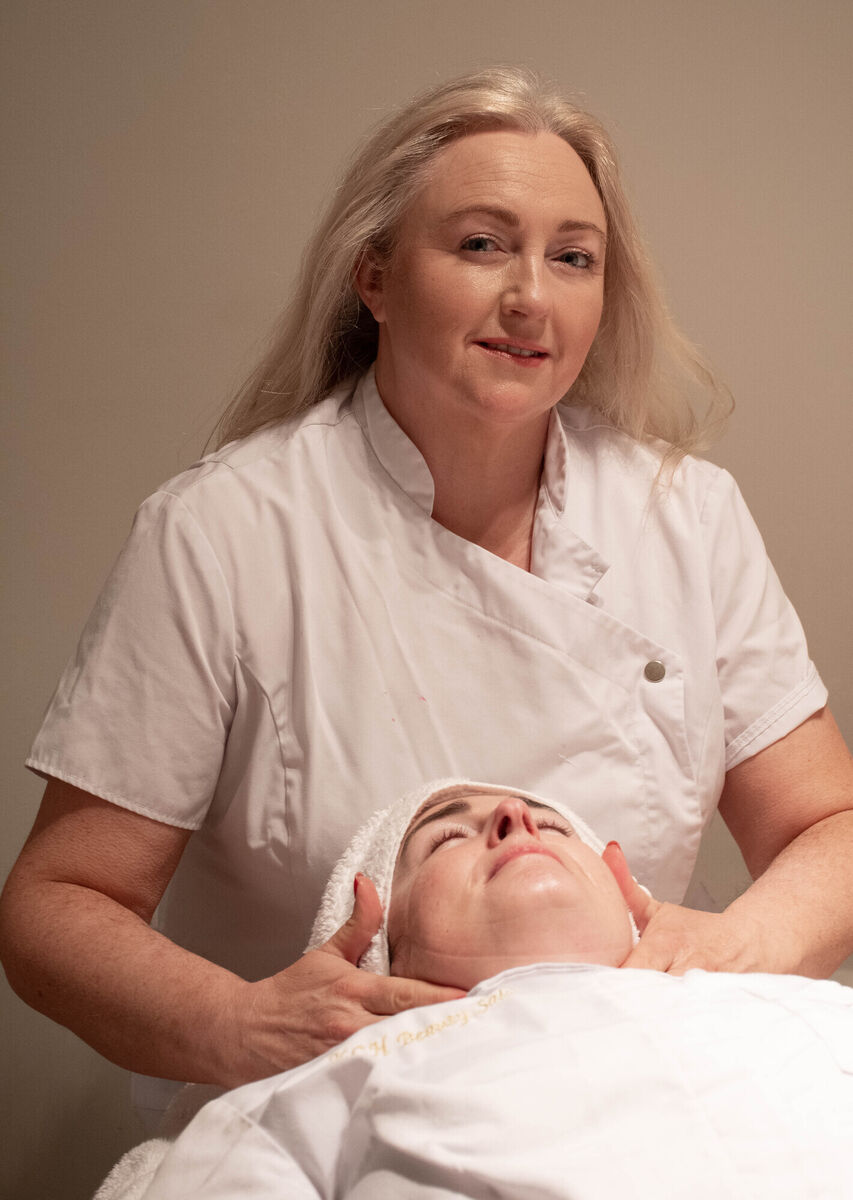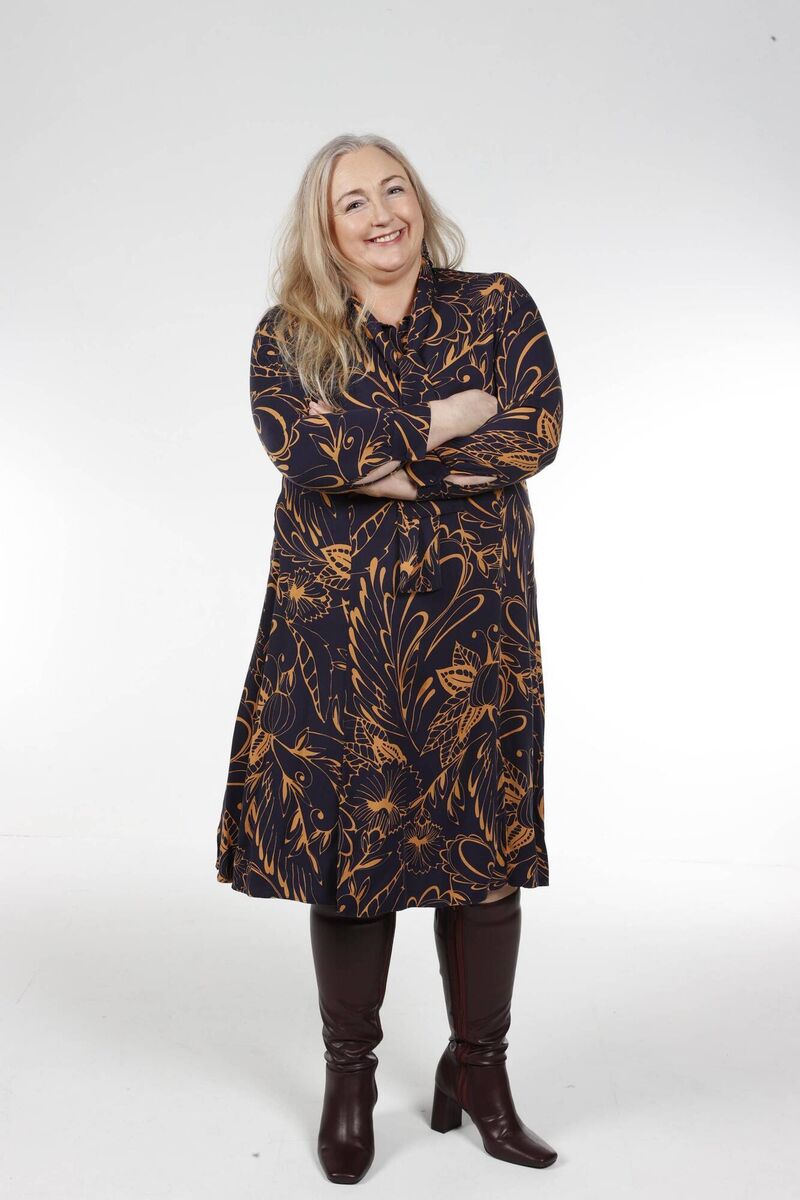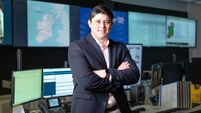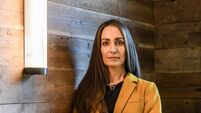"My new life begins at 50," says reality TV star Kathleen

Kathleen Hurley Mullins, of KCH Beauty Salon in Youghal, Co Cork, urges women to keep a complete check on their health during menopause to ensure you don't miss any other serious illness. Picture: Howard Crowdy
Last year, Cork businesswoman and mum of two, Kathleen Hurley Mullins (50), had a dermoid cyst and both ovaries removed.
This life-changing procedure came fast on the heels of the shocking discovery that her beloved sister, Susan, whom she never suspected to be unwell, had only days to live; her health having been wrecked by ovarian cancer which spread throughout her body.
At the time, Kathleen was 49 years of age. While she had no symptoms of menopause before the surgery, ten days later, a whole clatter of them hit her so hard it was akin to falling off a cliff.
“I had burning feet, night sweats, brain fog,” she recalls. “I’d always carried weight, but I felt then that my midriff had thickened. It seemed that every symptom of menopause hit me.
“I’ve found that a lot of things hit women aged 45-50, when they mightn’t even feel they have symptoms of menopause. Women, whether mother, daughter, sister, tend to put others ahead of them, while they themselves can feel isolated and excluded from gatherings. It can be a time when things that wouldn't have bothered them in their youth can really start to hit.
“Maybe you’d hear two friends of yours went for coffee and you weren't invited. That might play on your mind, and instead of initiating coffee mornings yourself, you may pull back and feel even more isolated, and I must admit there have been times when I’ve felt very much like that. I called myself Mrs Nobody. For a lot of women at this life stage, you do feel invisible, not attractive anymore."

It’s all wrong when any woman describes herself as Mrs Nobody. She is, of course, anything but. She’s a born communicator: open, interested, interesting and smart. She’s also warm and fun. But when our conversation turns to women’s health, she speaks with unmistakable passion and verve.
Would Kathleen agree that going through menopause is a journey a woman takes alone?
“Even though you are not alone, you go through it alone and it’s your own journey,” she replies. “A lot of men don't want to know about these things, and if the wife is not happy they don’t know how to please her.”
She’s quick to say that her own husband, whom she delightfully describes as ‘‘the gorgeous Tony", has always been a great support.
“But as good as any husband can be, a woman has to come through menopause herself. It’s a time when many women feel different to the way they used to feel. This can bring a lot of emptiness.”
Our chat then turns to CUH, which is close to her heart. She remembers receiving ‘fantastic’ treatment there at 7 years of age when a storage heater fell and broke one of her legs. She tells how members of her wider family have been treated there for Alzheimer’s, tumours, broken hips and more.
She talks highly of ‘the wonderful’ consultant obstetrician and gynaecologist, Dr Mairead O’Riordan and she becomes emotional when recalling the kindness of Professor Barry Plant who was ‘a complete gent’ when her late sister, Susan, was under his care at CUH.
Recalling the devastation of watching her sister lose her battle for life and how it impacted her, she says: “You’re watching someone dying and they’re fighting to live. I could see then that I’d got to live my life to the fullest every day.
“I was very overweight back then and I said to myself: Since I’m here, I may as well feel as if I am living fully, getting out there, getting fitter and getting better, and not just trudging through life.”
This she did and admirably too. Discussing her journey, she shares: “I thought I was finished when I learned both ovaries were to go. Then when they were removed, the price I had to pay was surgical menopause. After that, life moved on again and I said to myself: Right, this year now, I’m going to try for RTÉ’s Operation Transformation.
She used that platform benevolently. Anyone who watched her, came away wiser. She was a dynamo of an am ambassador, generating greater awareness of the issues around cancer, menopause, stress incontinence and the importance of self-care.
On the topic of cancer, Kathleen wants people to be more aware of what’s going on in their bodies: “If they get aches and pains, some go straight to a health food store. What they find there is complimentary. It’s important to see a GP first and to not delay, as time may be of the essence. I can’t stress that enough.”
Kathleen says she come across "angry women all the time who don’t think they’re going through menopause but may well be". She recommends ‘The Greene Climacteric Scale’ as a useful index which lists 20 symptoms of which women should be aware.
We talk then of how fear can stop us from having health concerns investigated.
“Fear of the unknown is huge,” she says. “When I learned I had to have both ovaries removed, I feared the result. I also feared how life might go on afterwards, if say, further surgery was required.
“I feared for my family and how they might cope: my husband and children on the farm. Also, my business (KCH Beauty Salon in Youghal, which she runs with her sisters, Mary and Noreen).
“When fear hits, you never see the bigger picture,” she continues. “You just see what's happening. Fear of what’s out there and of what’s ahead.”

How’s she doing now?
“I’m pushing through my fears,” 'she replies. “But often, we can’t get the reassurance we’d like.”
We chat then about the human desire for affirmation. Kathleen remembers a time when after a media interview she asked a radio producer how she did. You were fine, came the reply.
That producer was being nice I know,” she says. “But still, the effect their words had on me was negative. It was my own fault, of course. I shouldn’t have asked for their opinion, because their words deflated me and I felt again that I was being viewed as Mrs Nobody.
“We take things to heart too much for our own good. I should have brushed off those words. I shouldn’t have asked: How did I do? I shouldn’t have sought their approval and reassurance.” She’s a lady with great empathy for those who struggle silently in life.
“If doors get closed on people once too often, lives can be shattered and others are quick to judge,” she says. “ A kind word costs nothing and can mean so much.
“It can feel like a big bad world out there for those who are not confident enough in themselves, who are easily knocked. And sometimes when they fall or get knocked too often, they can’t get back up.”
As she says this, I recall her telling me earlier that at 47 her biggest fear was that she’d trip on a footpath.
Even so, she used to love going for long walks until stress incontinence put a stop to that: “It got so bad I stopped going for walks and stopped exercising altogether.”
Help came in the form of physiotherapist Shalini Wiseman of Cork Women’s Clinic. Also, Yvonne Brady, whose EVB Sports brand of clothing Kathleen describes as a hammock for the pelvic floor.
“They hold everything in position,” she says of the brand, "and help take away the sensation you need a bathroom when really you don’t.”
Kathleen’s been through a lot and changed accordingly. “I feel much more confident,” she shares. “I look better. My central core is stronger. I stand straighter. My body and mind are getting healthier.”
She’s one to question the status quo. Recalling the ‘fantastic’ treatment she received as a public patient at CUH.
“Wealth can make some more equal than others in the healthcare system and this shouldn't be so. “Women should be offered mammograms at 40 instead of 50,” she continues.
On the topic of HRT she says: “It’s fantastic for many and lots and proven to be very safe to take and lots more should take it. But I think ovaries and breasts should be checked before HRT scripts are written.”
I suspect her call for caution is influenced by her health history: loss of a family member to ovarian cancer that spread, having her own ovaries removed, and the recent shock of being recalled after a mammogram to have a biopsy and pin inserted.
“That knocked the socks off me at first,” she says of the biopsy. “I had no lumps, nothing to indicate I might be recalled.”
As we speak, she’s still waiting for the biopsy results.
It’s a rainy weekday morning several days later when my phone rings and Kathleen’s on the line.
“I got the results,” she says. There’s a pause. “It’s the all clear!” she cries, as we whoop and cheer while sunshine beams through the rain.












